Newton County Mine Tailings National Priorities List (NPL) Superfund Site, Newton County, Missouri - Fact Sheet, March 2023
Free Lead Testing and Cleanup Opportunity
Remedial and Removal Actions
Site Overview and Update
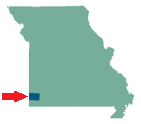
EPA Region 7 is remediating (cleaning up) lead contamination across the Newton County Mine Tailings (NCMT) National Priorities List (NPL) Superfund Site (site) in Newton County, Missouri. Lead, zinc, and other mining wastes have been found across the site at residential properties, former mining areas, and child high-use areas (such as parks, recreational areas, playgrounds, and child care centers). Heavy metals associated with historical mining activities have also been found in private domestic drinking water wells.
Lead is a toxic metal that is harmful if inhaled or ingested and can pose serious health risks, particularly to children under 7 years old, as well as pregnant women and nursing mothers. The main contaminants of concern include three heavy metals: lead, arsenic, and cadmium. EPA offers free lead testing and cleanup at eligible properties to protect the public from lead hazards and childhood lead poisoning.
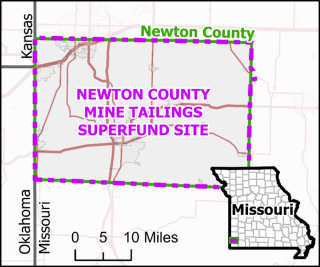
Free Lead Testing and Cleanup Opportunity!
If you would like to have your residential yard (soils) and/or private, domestic drinking water well tested for potential lead contamination, please contact EPA today! Again, lead testing and remediation (cleanup) are performed by EPA at no cost!
Contact Us Today!
- Call EPA’s sampling contractor, Tetra Tech, at 417-385-8487.
- Contact EPA toll-free at 1-800-223-0425 or by email at r7‑tsmd@epa.gov (see EPA contacts below).
How Do I Participate?
EPA will request permission to access your property to test for potential lead contamination. Contact EPA or EPA’s sampling contractor, Tetra Tech, to sign a permission form (consent to access) and arrange to have your yard and/or private, domestic drinking water well sampled for lead or other heavy metals associated with historic mining on the site.
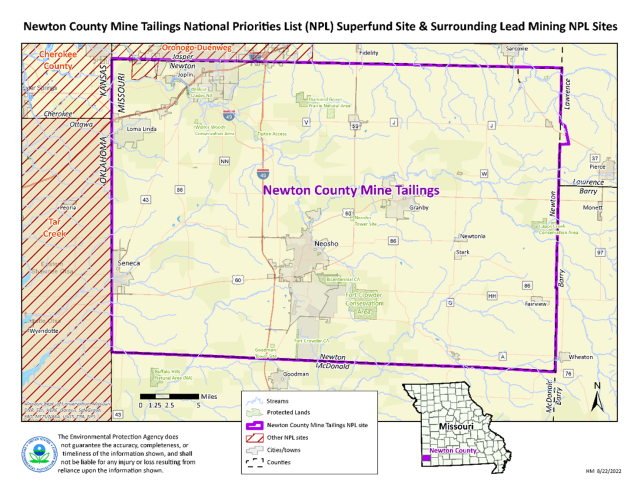
The process includes five simple steps to test and/or clean up your property:
- Sign and return the consent to access form by mail or email.
- After EPA collects samples, the testing results will be mailed to you. If your property qualifies for remediation (cleanup), EPA’s cleanup permission form (consent to access) will be included in your results letter.
- Just sign and return the form by mail or email to allow EPA’s contractor to clean up eligible parts of your residential yard or address lead contamination in your private drinking water well for free.
- EPA will supply alternate water for eligible properties with either free bottled water or free drinking water filters for under the kitchen tap. Even if you have a water softener in your home, you still need a lead test, and could need alternate water.
Current Site Status and Next Steps
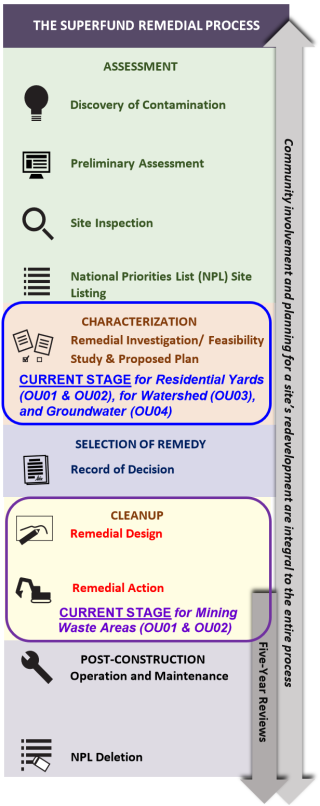
The NCMT site boundary now includes over 600 square miles of Newton County and a portion of Lawrence County. This site is part of the Tri-State Mining District (TMSD) where mining, milling, and smelting of lead and zinc ore started in the mid-1800s and continued for more than 100 years. (See map below.) The site includes mine waste contamination in several former mining areas.
EPA began site investigations in 1986 and added this site to the NPL in 2003. Removal actions began in 1999 at project areas now known as Operable Units 1 and 2 (OU1 and OU2). EPA later divided the site into four OUs:
- OU01: Established for historic remediation work performed by responsible parties – no longer active.
- OU02: Granby, Wentworth, Spring City Spurgeon, Stark City, Diamond, and remainder of Newton County.
- Mining Waste: EPA has remediated nearly 1.4 million cubic yards of mining wastes and contaminated soil. More than 150 acres of mined land have been restored to beneficial use. During the investigation and cleanup, EPA continues to work with state and local agencies and aims to reduce disruptions to the public’s enjoyment of recreational areas, such as the Walter Woods Recreational Area. The cleanup of Dick Smith Park in Granby was completed in 2021.
- Residential Yards: Since 1999, EPA has cleaned up over 300 residential yards (under an ongoing Removal Action). EPA is conducting a Remedial Investigation and Feasibility Study (RI/FS) to figure out the best way to address lead contamination of residential yards and child high-use areas (child care centers, parks and playgrounds) throughout the site. Once completed, EPA will publish a Proposed Plan and seek public input. Contact EPA today for more information about this free testing and cleanup opportunity!
- OU03: Spring River Watershed – In recent years, approximately 1,300 feet of streams have been remediated. EPA is also working on an RI/FS for the TSMD watershed to address contamination, and will also issue a Proposed Plan with opportunities for public input.
- OU04: Groundwater – Once the RI/FS is complete for this Operable Unit, EPA will issue a Proposed Plan to address lead contamination found in groundwater at private, domestic drinking water wells across the site. Contact EPA about free lead testing of private drinking water wells under EPA’s Removal Action. For residences that qualify, EPA is providing an alternate source of clean drinking water.
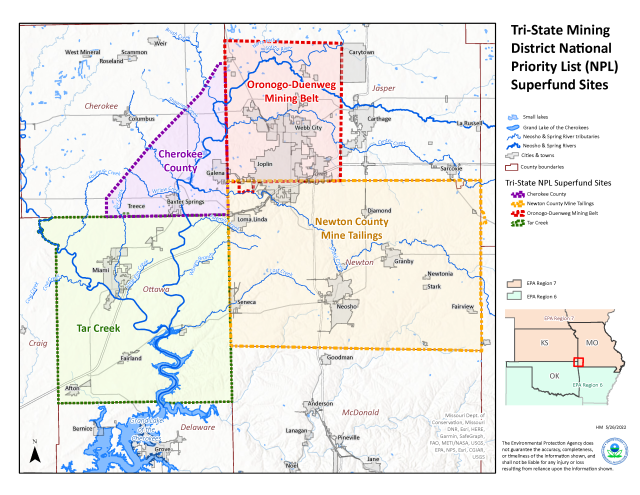
Annual Childhood Lead Testing
It is important that children under 7 years old have their blood lead level tested annually, because children suffering from lead poisoning do not always look or act sick.
The only way to know if your child has elevated levels of lead in their blood is to have their blood tested. Talk to your pediatrician, general physician, or the Newton County Health Department (417 451-3743) for more information about testing your child.
Lead and Site Information
Site project information is available to the public at web repositories. Administrative Record files and Records of Decision contain important decision documents. Visit EPA’s Site Profile page (see Site Documents & Data).
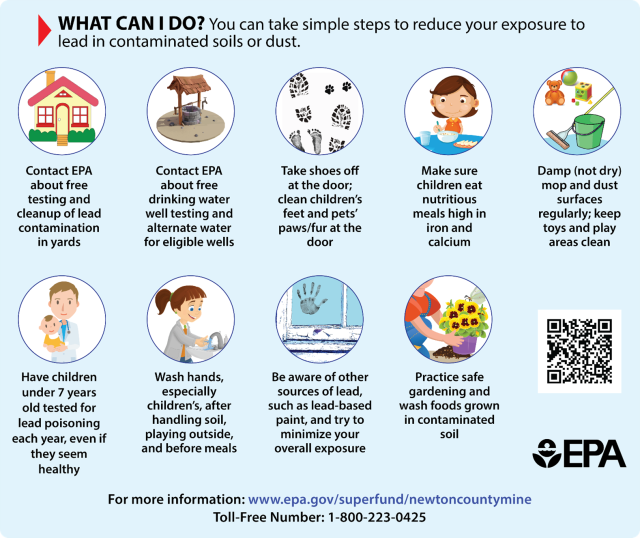
If you do not have internet access, you can also view these documents online during normal business hours at the following locations:
EPA Region 7 Records Center
11201 Renner Blvd.
Lenexa, KS 66219
1-800-223-0425
Newton County Public Library
201 W. Spring St.
Neosho, MO 64850
417-451-4231
EPA also posts Fact Sheets for Missouri sites online.
For more information about lead, visit:
Site Contact Information
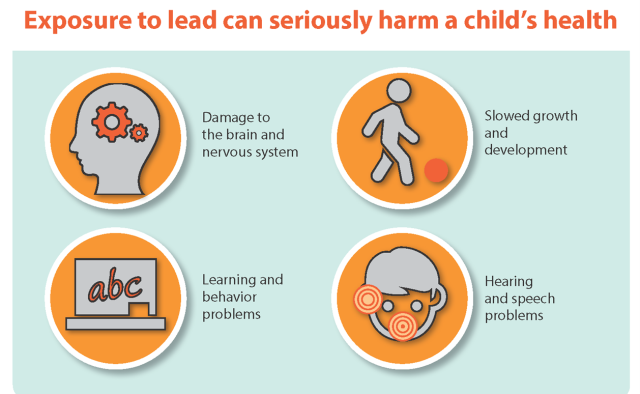
EPA continues to have opportunities for public input, including public comment periods. Questions, comments, or requests for site information can be directed to EPA. (See mailing address and toll-free number below):
Elizabeth Kramer
EPA Community Involvement Coordinator
Phone: 913-551-7186
Email: r7-tmsd@epa.gov or kramer.elizabeth@epa.gov
Augustine “Austin” Clapp
EPA Lead Remedial Project Manager (RPM)
Phone: 913-551-7035
Email: clapp.augustine@epa.gov
Creenen McGuire
EPA Groundwater RPM
Phone: 913-551-7124
Email: mcguire.creenen@epa.gov
Griff Hoffman
EPA On-Scene Coordinator (for Removal Program Actions)
Phone: 816-890-0108
Email: hoffman.griff@epa.gov
For health-related questions, contact: Cory Kokko, CDC/Agency for Toxic Substances and Disease Registry regional representative; phone: 913-217-5981; email: ckokko@cdc.gov.
U.S. Environmental Protection Agency, Region 7
11201 Renner Boulevard
Lenexa, KS 66219
Toll-free: 1-800-223-0425
